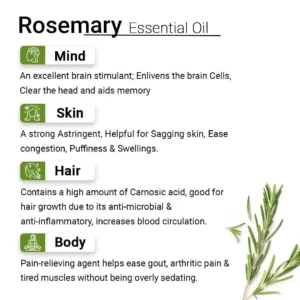Rosemary (Rosmarinus officinalis) is a fragrant, evergreen herb native to the Mediterranean region, renowned for its culinary uses and potential health benefits. It belongs to the mint family (Lamiaceae) and is commonly used in cooking, particularly in Mediterranean and Middle Eastern dishes. Its leaves, which have a pine-like scent and a savory, slightly bitter flavor, are often used fresh or dried in a variety of recipes, such as roasted meats, soups, and stews. In addition to its culinary applications, rosemary is also valued for its medicinal properties, which have been recognized since ancient times.
Health Benefits
- Rich in Antioxidants and Anti-inflammatory Compounds: Rosemary is packed with antioxidants, which help neutralize free radicals in the body, potentially reducing oxidative stress and inflammation. These properties make rosemary beneficial for fighting chronic inflammatory conditions and promoting overall well-being.
- Improves Memory and Cognitive Function: Rosemary has long been associated with memory enhancement. Studies have shown that rosemary may improve memory, concentration, and cognitive function. For instance, a 2018 study found that university students who took rosemary supplements exhibited significantly improved memory performance. The herb contains compounds like carnosic acid, which may help protect the brain from age-related damage, potentially benefiting those at risk for Alzheimer’s disease and other cognitive disorders.
 Mood Enhancement and Stress Reduction: Research suggests that rosemary may help alleviate stress and anxiety. A 2020 study on university students found that rosemary extract improved sleep quality and reduced anxiety. Some studies have even proposed that rosemary’s antidepressant effects could regulate brain chemicals like dopamine, promoting emotional well-being.
Mood Enhancement and Stress Reduction: Research suggests that rosemary may help alleviate stress and anxiety. A 2020 study on university students found that rosemary extract improved sleep quality and reduced anxiety. Some studies have even proposed that rosemary’s antidepressant effects could regulate brain chemicals like dopamine, promoting emotional well-being.- Neurological Protection: Rosemary contains carnosic acid, a compound known for its neuroprotective effects. Animal studies suggest that rosemary may help protect the brain from damage caused by free radicals and could even help slow the progression of diseases like Alzheimer’s. Additionally, rosemary aromatherapy has shown potential in improving cognitive function in individuals with Alzheimer’s.
- Pain Relief: Rosemary has traditionally been used as a mild analgesic. It is particularly helpful in treating neuropathic pain, which is caused by nerve damage. Rosemary essential oil is also known for its antibacterial properties, making it useful in promoting faster wound healing. However, it is important to dilute essential oils before topical application to avoid irritation.
- Cancer Prevention: Preliminary studies suggest that rosemary may have potential anti-cancer properties. Research has shown that rosemary extract can inhibit the activation of carcinogens, reduce tumor growth, and increase antioxidant enzyme activity. While these results are promising, further research is needed to fully understand rosemary’s potential role in cancer prevention and treatment.
- Skin Health: Rosemary’s anti-inflammatory properties may help with skin conditions such as acne, eczema, and psoriasis. Some studies also suggest that rosemary has anti-aging effects, as its antioxidant compounds may protect the skin from UV damage, promoting healthy, youthful skin.
- Supports Immune System: The antibacterial, antiviral, and antifungal properties of rosemary may help support the immune system by lowering the risk of infections and aiding in the recovery from illnesses. Consuming rosemary regularly can strengthen the body’s defenses against pathogens.
 How to Use Rosemary
How to Use Rosemary
- Culinary Use: Rosemary is commonly used in cooking to add a fragrant, savory flavor to various dishes. It pairs well with roasted meats (such as lamb, chicken, and pork), vegetables, soups, and stews.
- Rosemary Tea: To make rosemary tea, steep fresh or dried rosemary leaves in hot water for about 5–10 minutes, then strain and enjoy. This tea is believed to have calming and cognitive-enhancing effects.
- Essential Oil: Rosemary essential oil is widely used in aromatherapy to boost mental clarity, reduce stress, and improve mood. It can be inhaled by adding a few drops to a diffuser or bowl of hot water. Topically, rosemary oil should be diluted with a carrier oil (like coconut or almond oil) before applying it to the skin.
- Topical Use for Pain Relief: Rosemary essential oil can be diluted and applied to areas of discomfort for its pain-relieving effects. It is also used to help speed up the healing of wounds and cuts.
Precautions
While rosemary offers numerous health benefits, it is important to use it in moderation, especially in concentrated forms like essential oils. High doses of rosemary oil may cause adverse effects such as vomiting, coma, or pulmonary edema. It is also known to interact with certain medications, including blood thinners, and should be used cautiously by individuals with preexisting conditions or those who are pregnant or breastfeeding. Always consult a healthcare professional before using rosemary as a supplement or essential oil, especially for medicinal purposes.
Conclusion
Rosemary is not only a flavorful addition to many dishes but also a herb with a variety of potential health benefits. From supporting brain health and improving memory to offering pain relief and aiding digestion, rosemary is a versatile herb that has been used for centuries. Whether enjoyed as a culinary herb, in tea, or as an essential oil, rosemary can be a valuable addition to your health regimen.



